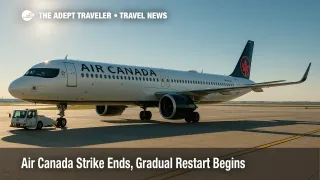Air Canada strike ends, gradual restart begins

Air Canada and the Canadian Union of Public Employees reached a tentative agreement overnight on August 19, 2025, ending the Air Canada strike that halted mainline and Rouge flying. The carrier said it will restart service gradually beginning this evening, with a full return to regular operations expected to take about seven to ten days as aircraft and crews are repositioned. Travelers should plan for continued cancellations, limited seats, and rolling misconnections during the reset.
Key Points
- Why it matters: The Air Canada strike is over, but recovery will take a week or more.
- Travel impact: Expect rolling cancellations, thin partner inventory, and airport crowding through August 26.
- What's next: Flights ramp up in phases as aircraft and crews return to plan, with priority on core domestic and transborder banks.
- Refunds and rebooking follow Canada's APPR 48 hour rule if the airline cannot get you moving.
- Jazz and PAL operated Express flights were less affected, but connections remain constrained.
Snapshot
The agreement ends four disruptive days that affected roughly 130,000 passengers per day during peak season. Air Canada will rebuild its schedule in banks, starting with domestic and Canada-U.S. flows before long haul stabilizes. During the next seven to ten days, some flights will remain canceled as crews and aircraft are repositioned and connection times are rethreaded. Travelers with canceled segments can request refunds, while those who still need to travel should use free rebooking options and monitor updated itineraries closely. Avoid the airport unless you have a confirmed seat, and expect lines at Toronto Pearson International Airport (YYZ), Montréal Pierre Elliott Trudeau International Airport (YUL), and Vancouver International Airport (YVR).
Background
Talks broke down over compensation, including pay for ground duties such as boarding, which attendants say has been unpaid. After a weekend shutdown, the government's back-to-work pressure failed to produce an immediate return, but overnight mediation produced a tentative deal. Air Canada withdrew guidance during the stoppage and has not released deal terms pending ratification. For travelers, the key shift now is from stoppage to recovery, which typically takes several days even after a strike ends because of aircraft positioning, crew legalities, and schedule bank rebuilding. Our earlier coverage traces the escalation and government intervention in detail, including Air Canada CEO defends offer as strike defies order and Air Canada strike, Ottawa orders binding arbitration.
Latest Developments
Recovery timeline, where flights resume first
Air Canada plans a phased ramp beginning the evening of August 19. The airline and independent reporting say a full return to regular service will take roughly a week, possibly up to ten days, as crews time out and long haul rotations are rebuilt. Expect earlier stabilization on large domestic spokes and Canada-U.S. routes that feed the main hubs at Toronto, Montréal, and Vancouver. Long haul will normalize later, and some cancellations will continue during the reset. Check Manage My Booking for automatic rebooks, and do not assume minimum connection times will hold during recovery.
Refunds and reaccommodation under Canada's APPR
Under the Air Passenger Protection Regulations, a labour disruption is treated as outside the airline's control. Air Canada must rebook you at no extra cost on its next available flight, or on a partner, and if it cannot depart within 48 hours of your original time, you can choose a refund or free rebooking on any airline, including a competitor. If the 48 hour window is missed from your origin, the carrier must also consider departures from a nearby airport and provide transport there. Lump-sum APPR compensation does not apply to outside-control events, but refunds and rebooking obligations do.
Analysis
Operational restarts are rarely clean. Aircraft and crews sit out of position, legal duty limits throttle how quickly flying can scale, and long haul rotations require synchronized downline crews and maintenance. That is why a carrier the size of Air Canada needs a week or more to smooth schedules after a full or near-full stop. Expect the hubs, Toronto Pearson International Airport (YYZ), Montréal Pierre Elliott Trudeau International Airport (YUL), and Vancouver International Airport (YVR), to absorb most of the crowding and misconnections as transborder and long haul banks re-align. Reaccommodation will lean heavily on Star Alliance partners, but summer load factors mean spare seats are scarce, so push for confirmed rebooks as soon as they appear. Rights matter in recovery, too. If Air Canada cannot get you out within 48 hours, choose either a full refund to the original form of payment or a reroute on any airline at no extra charge. Do not accept a voucher unless it clearly serves your plans, and keep receipts for reasonable out-of-pocket costs on international itineraries where the Montreal Convention may apply.
Final Thoughts
The strike is over, but the recovery is a marathon, not a sprint. Use self-service tools first, verify operating carriers on codeshares, and protect long connections while the schedule is rebuilt. If you still need to travel, prioritize earlier departures, nonstop options, and hub-to-hub flights this week for better odds. If Air Canada cannot rebook you to depart within 48 hours, exercise your APPR choices for a refund or a reroute on another airline. With a little patience and a firm grasp of your rights, you can navigate the final stretch of the Air Canada strike.
Sources
- Air Canada to resume service as flight attendants' union ends strike, Reuters
- Air Canada reaches deal with flight attendant union to end strike, AP
- Flight delays and cancellations, APPR rebooking within 48 hours, Canadian Transportation Agency
- Airline labour disruptions, what passengers should know, Canadian Transportation Agency
- Flight attendants' union says strike has ended, CityNews Toronto
- Air Canada strike enters day four as talks resume, Reuters
